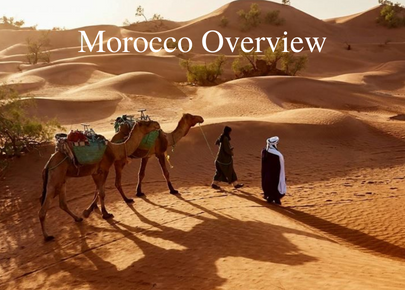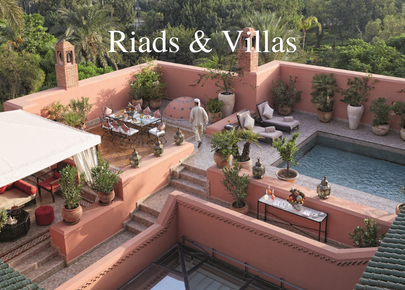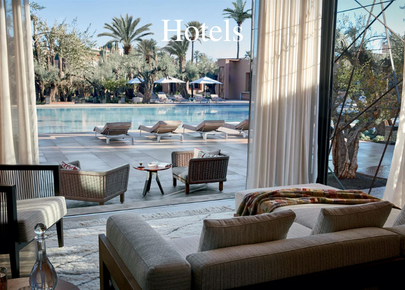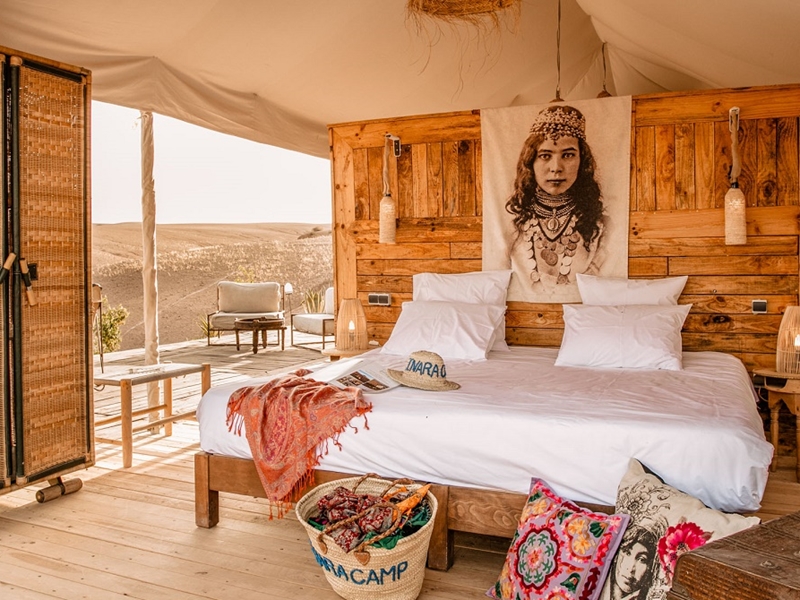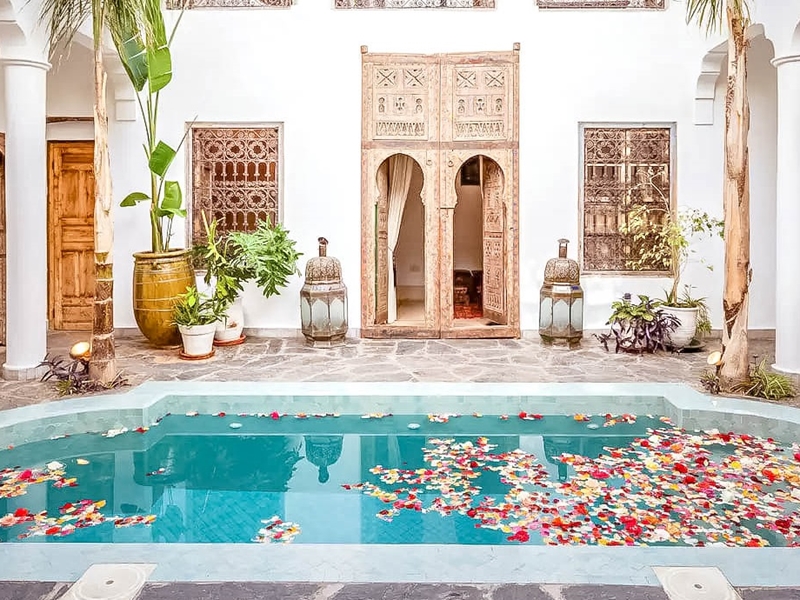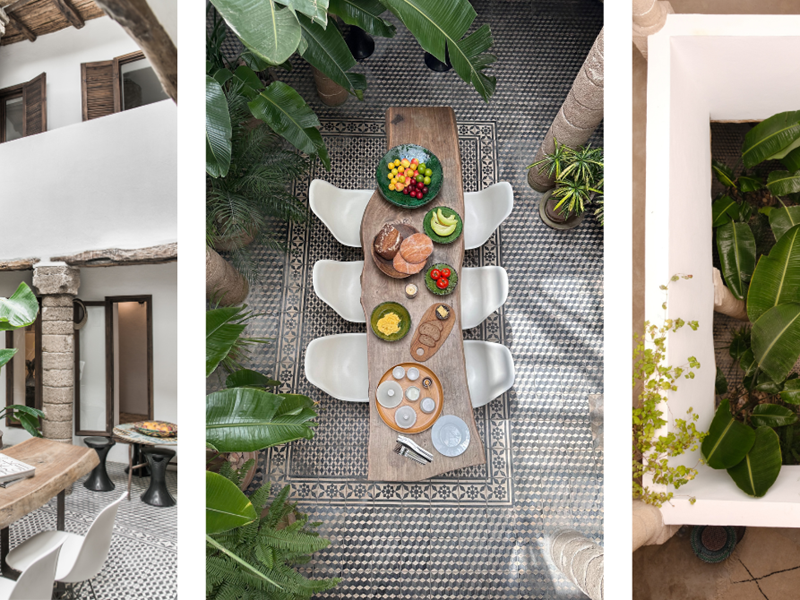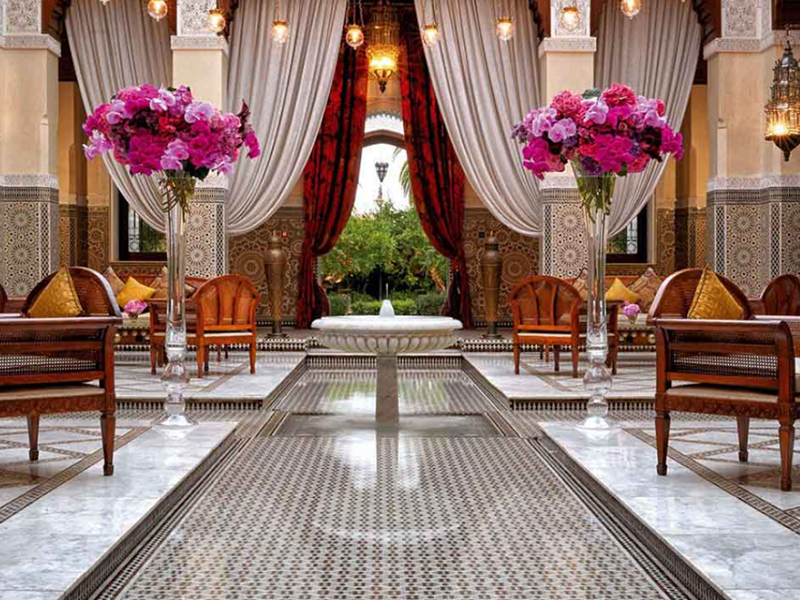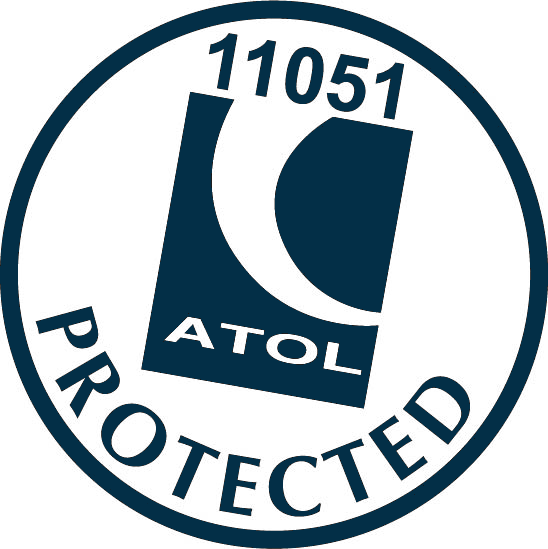Frequently asked questions about Morocco
| 1. Arriving into Morocco |
Most arrivals into Morocco from UK will be into Marrakech Menera airport, this airport is located a 10 minutes drive from the city centre and is used for exploring not only Marrakech, but the High Atlas Mountains and the coastal region around Essaouira.
The average flight time from London to Marrakech is just over 3 hours.
All arrivals into Morocco will need to complete a 'landing card' and hand this in with their passport at passport control. Some airlines will hand these small white paper landing cards out on the plane, if not, they are available upon arrival. You will need to fill in your passport information together with the place you are staying. We therefore recommend making sure you have some pens in your hand luggage ready!
We do recommend booking a private transfer from Marrakech Airport to your accommodation. Taxis are available but like many airports the taxi drivers can be very hard work and are eager to get as much money from you as they can! There are fixed prices set by the Government from the airport to the city centre, however, it will be near impossible to pay the fixed price or get anywhere near, haggling can become tiresome, fraught and stressful, especially after a long day and in a different country.
An airport bus is available for a few pounds each way and will drop you off in the centre of the city.
There is a public bus stop just outside the main entrance to the airport complex on the other side of the road and all of the buses stopping here will take you into the city centre for around 50p.
Many of the hotels and riad in Marrakech are located in the warren of alleyways of the ancient medina, often without vehicle access, We therefore recommend booking your airport transfer with your accommodation, the driver will know where to drop you off near your accommodation and a representative from your accommodation will be there to meet you.
| 2. What is the currency in Morocco? |
The legal tender in Morocco is the Moroccan Dirham (MAD), this comes in notes to the value of 20Dh, 50Dh, 100Dh & 200 Dh and coins to the value of 0.5DH, 1Dh, 2Dh, 5 Dh and 10Dh. There are 100 centime to a Dirham and theses come in 5, 10 & 20 Centime coins.
The Moroccan Dirham is a closed currency, this means that you cannot purchase the currency outside the country. However, you will sometime see the currency on sale in the UK at the airport exchange booths, albeit at a terrible exchange rate.
You can take clean, undamaged GBP (Scottish and Northern Irish notes are unlikely to be accepted), USD and EUR notes. These can then be exchanged at banks, post office and foreign exchange booth throughout the country. ATM are also readily available through the major towns and cities.
Credit cards will be usually be accepted in supermarkets, shopping malls and large restaurants.
You can only import or export up to 1000Dh (about £80) to or from Morocco, therefore, it is best to change of withdrawn only enough money that you will need or little and often so you are not left selling the unused notes back a an unfavourable rate. You will often get asked if you have any currency at the airport and be asked to leave it.
| 3. What lanaguage is spoken in Morocco? |
The two official languages of Morocco are Standard Arabic and Tamazight (language of the native Berbers). The main language spoken in Morocco is Moroccan Arabic (Known a Darija), however French is taught in schools and widely spoken as a second language. In the tourist areas of Morocco many will also speak English.
| 4. How should I dress in Morocco? |
When out and about in the Marrakech you will see a mixture of both traditional conservation attire as well as western style of clothing. You will see tourist wearing a mixture of clothing, however, it is recommended to wear (for both men and women) shorts or skirts below the knee and for shoulders and upper arms to be covered. Aside from dressing in a respectful manner, light loose clothing covering as much skin as you can is a very good idea to protect yourself from the intense strength of the sun. If you are visiting historic sites and museums it is highly recommended to wear skirts/shorts below the knee and cover shoulders and upper arms.
In more rural areas of Morocco not on the traditional tourist routes it is recommended, for both men and women to dress conservatively in long trouser/skirts and covering up of the upper body, shoulders and upper arms.
In the tourist coastal regions, the usual clothing you would wear on European beaches would be fine; however swimwear should be worn only on the beach of around the pool.
| 5. What is it like as a non-Muslim visiting Morocco |
Morocco is a Muslim country which follows Islamic laws and customs. Be aware of your actions to ensure they don't offend, especially during the holy month of Ramadan or if you intend to visit religious areas. You should respect local traditions, customs, laws and religions at all times.
Although Morocco is a Muslim country it is one of the more liberal Arab Muslim countries when it comes to stances often associated with Islam, such as women's rights, women's clothing and alcohol.
Moroccans are generally conservative about their relationships and it is unusually to see public acts of affection between men and women including holding hands (although it is very common for men to walk hand in hand as a sign of friendship). Unmarried couples are not permitted to share a hotel room however this is not an issue as a foreigner. However, there have been incidences where unmarried tourists with an Islamic name have been declined a hotel room to share.
Travel is about experiences, whether it is a different landscape, cuisine or culture and it is about respect for those differences. Woman who wear 'revealing clothes will often experience more attention than what they are used to at home and often feel more comfortable in loose light clothing that covers the arms and legs, a scarf is a good item to have with you as it allows you to cover your head and shoulders from the sun, demonstrate respect when entering a household or tradition building, or for use as a shawl for warmth in the evening when the sun sets.
| 6. What is it like visiting Morocco during Ramadan? |
Ramadan is the ninth month of the Islamic calendar, a lunar calendar consisting of 12 lunar months and 354 or 355 days, which means it is shorter year than the Gregorian calendar used in the majority of the western world, this means that Ramadan occurs at a different time each year (based on the Gregorian calendar). Ramadan is the Islamic holiest month where Muslims will fast from dawn to sunset, of course the length of fasting each day directly corresponds to the time of year that Ramadan occurs; the days are long in summer.
Ramadan lasts 29 or 30 days, from the sighting of the crescent moon to the next.
In the mains tourist areas of Morocco you will find that restaurants will stay open during the day during Ramadan, however outside of these tourist areas restaurants will remain closed during the day, however may open early before sunrise and later into the evening after sunset.
Some tourist attractions may alter their opening hours during Ramadan.
The sale of alcohol from supermarkets and off-licences is banned during Ramadan although many hotels will continue to sell and serve alcoholic drinks.
Drinking on the street or in public spaces in Morocco is not allowed at any time, drinking alcohol during Ramadan is highly frowned upon and especially to show any public drunkenness.
As a show of respect it is recommended to dress more conservatively during Ramadan.
It is worth noting that fasting (and the giving up of tobacco) during Ramadan can lead to to people having a much shorter temper than they usual.
Most Moroccans will join family and friends when the sun sets to break fast and eat, this meal can often go on late into the evening (especially) during summer which results in many people getting up later during Ramadan, For this reason you may find that businesses may open a little later in the morning and may not be open or have a limited service for the two hours after sunset.
| 7. Is alcohol available in Morocco? |
Alcohol is available to purchase is many hotels, riads, bars and restaurants, nightclubs as well as in many supermarket. Supermarkets will often a separate room for the sale of alcohol and you will usually find most international brands of beer, wine and spirit, together with local beer (Flag (pilsner), Stork (light lager) and Casablanca (Premium lager), Moroccan wines (due the French 'influence' over the country Morocco produces some very good quality wine). You may have to show your passport when purchasing wine in a Moroccan Supermarket.
During Ramadan, alcohol is not generally sold in supermarkets, although many hotels and restaurants will continue to serve.
| 8. Do I need a visa? |
British nationals don't need a visa to enter Morocco for the purpose of tourism for up to 3 months. When entering the country, make sure your passport is stamped. Some tourists have experienced difficulties leaving the country because their passport bears no entry stamp.
| 9. Is Morocco safe? |
The Moroccan Government are investing heavily in the tourism infrastructure in the country as well as promoting Morocco as a tourist destination.
Almost 700,000 visitors from the UK go to Morocco each year and for the majority of these their visit is trouble-free.
Morocco is a relatively safe place to visit with serious crime against tourists low, Moroccan tend to be warm and friendly to visitors. However, much or Morocco's economy is depends on tourists and some locals do seem 'wealthy tourists' as cash cows and may prey on them with scams, 'tourist traps' and 'faux guides' especially in the medina of Marrakech. It is inevitable that you will get lost exploring the narrow winding alleyways of the souks, and it is equally inevitable that you will get approached by a helpful local offering to take you back to the main square or your accommodation, these helpful locals will more often than not demand a high payment once you get to your destination, or decide that you actually want to go to their uncles carpet shop!
Other tricks to be aware of are;
'There is a traditional Berber market on today for local, follow me and I will take you there'
'That road is closed because of the Mosque, let me show you a different way'
Your accommodation will usually provide your with a map and highlight the route the the main square (known as Jemaa El Fna square or Le Place). You can download offline maps on Google maps and use your phone to navigate.
Sim cards are usually handed out free on arrival at Marrakech airports (the mains networks are Inwi, Orange & Maroc Telecom) and you can go to most kiosk and shops to top up with data for a few pounds. Inwi has many shops all over Marrakech and will help you top up your phone. This will then allow you to easily use a map service on your phone.
When walking around the Medina, if you look up you will see blue signs saying Le place with arrows to follow to get you back to the main square.
Finally if you are lost, it is better to ask one of the shop keepers to point you in the right direction.
As with any tourist area, please beware of your personal possessions as pick pocket can be active, ensure your phone, wallets etc should be kept in an zipped inside pocket and handbag across you're your body and zipped up.
| 10. Do I have to haggle for everything in Morocco? |
The shops in the shopping malls and supermarkets will shop the price on all items for sale so there is no need to haggle, Once you are in the souks of the Medina you will find that the goods for sale do not have price tags and it is down to haggling over the price, which is all part of the experience and fun. You will see many online guides/blogs that say never pay more than 50% the first price offered, but in reality the shopkeeper has read the same blogs and will go in with a higher first price. The trick is to get an idea of what you would pay for a similar item for sale back at home, and then decide what the maximum would pay for the item. You would then make a very low first offer, the shopkeeper will be shocked and insulted and tell the price is a very high amount, it is then down to going backwards and forward until you reach a price you are both happy with, but do not go above the price you set yourself, always be pleasant but be prepared to walk away, the shopkeeper may call after you with a lower price, or he may not, but the chances are you will see the same item a little further down the same street. If you follow this process then you will be happy with the price you paid, and even if someone else later tells you they purchased the same item for less, it does not matter as you were happy!
If you are in Marrakech and interested in purchasing some handicraft / traditional items, whether it is traditional clothing, leather shoes or bags or wood carved items but are not sure what to pay, then it is worth paying a visit to the Government operated fixed price 'Artisan Ensemble' located about a 10 minute walk from the main square, here you can wander around the various shops where you will not be hassled and the items have price tags. You can choose to purchase your item, or head back into the souk with the fixed price in mind and try and grab a bargain.
| 11. Do I need any vaccinations for a trip to Morocco? |
You should always discuss your travel plans in advance with your GP, who will be able to advise you on any vaccinations required.
| 12. Is it safe to drink tap water in Morocco? |
The water in the major cities of Morocco such as Marrakech is chlorinated and would not usually cause any harm and in fact much of the food that you eat will be prepared in tap water, however, as you are likely to be on holiday for a week or two, you would not wish to have an upset stomach, sickness or diarrhoea and therefore it is best to stick to bottle water for drinking during your stay. Bottled water is generally available in most shops and not expensive.
Most stomach illnesses abroad tends to come from eating without washing hands after a day exploring and touch many different surfaces.
| 13. Is tipping customary in Morocco? |
Tipping in Morocco is not mandatory, however most people will round up their bill when paying in a restaurant of leave some spare change, of course if you experience exceptional service then a larger tip would no doubt be appreciated. If you wish to tip a taxi driver or porter, these it is usually sufficient to tip 10 Dirham.
| 14. Should I take out travel insurance before visiting Morocco? |
Yes. It is important that before you book your holiday, you make sure that you have relevant travel insurance for you and your party. Find out more here. If you or any of your party develop COVID-19 symptoms while abroad, you should contact your travel insurance provider.
| 15. What is the internet/mobile service line in Morocco? |
Most hotels, riads and villas will have fast wifi access as will most restaurants, in cities and larger town, some public outside spaces will have wifi available.
Morocco is well covered with mobile phone access, however before bringing your own phone for use; it is worth checking with your provider for roaming charges. Mobile sim cards are readily available in Morocco and usually offered free to those arriving at the airport, they will just need a copy of your passport to register the card. It is easy top up at one of the many mobile phone shops or tobacconist and date can get about 10Gb of data for around £10.
If you have an old mobile phone at home that will allow sim cards from another network and has the ability to create it's own hotspot, it is a great idea to take this phone, add a local sim, top up with data and create a hotspot so that your whole family can connect to in and use the data.
Mobile service is reasonable good throughout Morocco although the more rural you are the more likely you will find yourself without service.
| 16. What are the toilets like in Morocco? |
In most modern hotels, riads, villas and restaurants you will find modern flushable toilets, however, in smaller restaurants, in rural areas and in public toilets you will find squat toilets. Toilet paper is not always provided so it is worth carry some.
| 17. Is Morocco a safe destination for LGBTQ+ travellers? |
Whereas Marrakech has been consider for many years to be a gay-friendly destination, homosexuality is not widely accepted in the community and homosexual acts (including kissing) are illegal in Morocco and may result in a fine or a prison sentence. It is recommended that LGBTQ+ travellers exercise discretion when travelling in Morocco and together with avoiding public displays of affection (the same goes for opposite sex couples), then there should not be a problem.
| 18. What is driving like in Morocco? |
Car rental offices are available both at the airport and in major cities, if you do hire a car it is recommended that you use a national or international chain and that you purchase additional full insurance. These are some common issues that you may encounter;
- You are often asked to inspect the vehicle in the dark or not given the opportunity to inspect.
- Thorough check for all marks, scratches, dents etc, both inside and out, as these may not be noted on your inspection paperwork. Make sure any defects/damage is noted on your paperwork before driving away. Take photos of anything under dispute, ensuring they are dated, it may also be worth recording any discussions about insurance and other important details.
- Check that the air conditioning is working.
- If your paperwork states that the fuel tank is fuel, please check this before driving away.
- If you purchase CDW (collision damage waiver) from the car rental office, you will not usually have to pay an excess, however, if you have purchased insurance with an online broker you may still need to pay the excess deposit, but this should be recoverable from your insurance policy.
- Often the car that you booked is not available and you may be provided with a lesser vehicle.
Moroccans drive on the right and give way to traffic on the left.
The roads in Morocco are generally in good condition, however in more rural locations the roads may be gravel or dirt. Driving in the large cities such as Marrakech can be a little fraught and very busy. It is not recommended to drive at night, as you will often find vehicles without lights, often on the wrong side of the road, whether it be a bicycle, car, tractor or truck.
| 19. What is a riad? |
A riad is a traditional house built around a central courtyard garden, they usually have very few windows to the outside, but the room windows open to the central courtyard and help keep the house warm in winter and cool in summer. The word riad comes from the Arabic would for garden.
Many riad remain family homes, whereas others have been restored and turning into boutique hotels or exclusive holiday accommodation.
A stay in a riad in the heart of Marrakech's medina is ideal for exploring the ancient narrow streets and souks and offers peaceful oasis in which to relax after a busy day.

